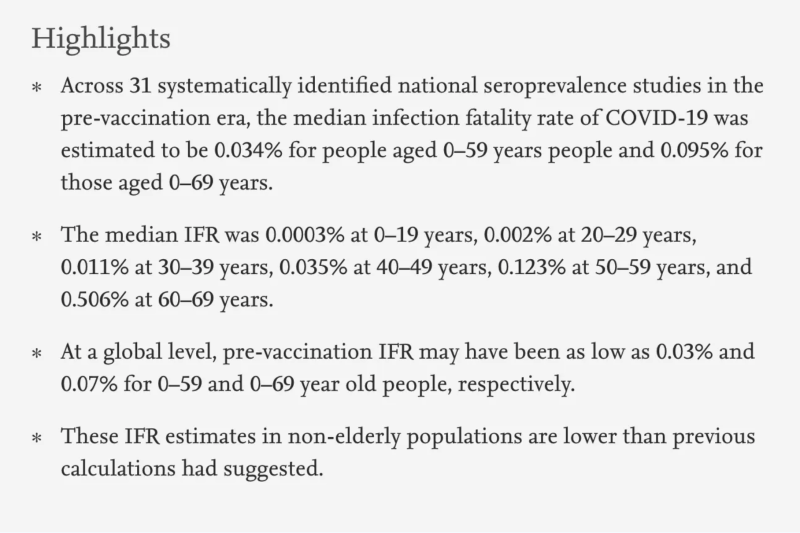A new paper documents that the pre-vaccination case fatality rate was extremely low in the non-elderly population.
Age-stratified infection fatality rate of COVID-19 in the non-elderly population
Environmental Research, Volume 216, Part 3, 1 January 2023, 114655
Abstract
The largest burden of COVID-19 is carried by the elderly, and persons living in nursing homes are particularly vulnerable. However, 94% of the global population is younger than 70 years and 86% is younger than 60 years. The objective of this study was to accurately estimate the infection fatality rate (IFR) of COVID-19 among non-elderly people in the absence of vaccination or prior infection. In systematic searches in SeroTracker and PubMed (protocol: https://osf.io/xvupr), we identified 40 eligible national seroprevalence studies covering 38 countries with pre-vaccination seroprevalence data. For 29 countries (24 high-income, 5 others), publicly available age-stratified COVID-19 death data and age-stratified seroprevalence information were available and were included in the primary analysis. The IFRs had a median of 0.034% (interquartile range (IQR) 0.013–0.056%) for the 0–59 years old population, and 0.095% (IQR 0.036–0.119%) for the 0–69 years old. The median IFR was 0.0003% at 0–19 years, 0.002% at 20–29 years, 0.011% at 30–39 years, 0.035% at 40–49 years, 0.123% at 50–59 years, and 0.506% at 60–69 years. IFR increases approximately 4 times every 10 years. Including data from another 9 countries with imputed age distribution of COVID-19 deaths yielded median IFR of 0.025–0.032% for 0–59 years and 0.063–0.082% for 0–69 years. Meta-regression analyses also suggested global IFR of 0.03% and 0.07%, respectively in these age groups.
The current analysis suggests a much lower pre-vaccination IFR in non-elderly populations than previously suggested.
Large differences did exist between countries and may reflect differences in comorbidities and other factors. These estimates provide a baseline from which to fathom further IFR declines with the widespread use of vaccination, prior infections, and evolution of new variants.


From the data above, Median infection fatality rate (IFR) during the PRE-VACCINATION ERA was:
- 0.0003% at 0–19 years
- 0.002% at 20–29 years
- 0.011% at 30–39 years
- 0.035% at 40–49 years
- 0.123% at 50–59 years
- 0.506% at 60–69 years
- 0.034% for people aged 0–59 years people
- .095% for those aged 0–69 years.
These IFR estimates in the non-elderly population are much lower than previous calculations and models had suggested.
Does anyone remember back to early 2020? The dire predictions of a global disaster – of a case fatality rate and of an infectivity rate (R0) that were unheard of in modern times for a respiratory disease? The predictions were that the “novel coronavirus,” as it was called then, was going to be the next Spanish flu. That the only solution was for entire nations to lockdown. This was the modeling that caused governments worldwide to panic. This was the modeling that caused the legacy media to melt down.
One scientist who clearly led this effort and led the world astray with his dire forecasting, was Neil Ferguson, PhD of Imperial College.
Ferguson’s team at Imperial College London has claimed credit for saving millions of lives through the lockdown policies that implemented his models. It is the Imperial College models that projected millions of deaths in the first year in the UK, if stringent lockdowns were not implemented. Once implemented, Ferguson and Imperial college quickly took credit for the “success” of lockdowns.
The estimate of 3.1 million lives saved by Dr. Ferguson was derived from a thoroughly “ludicrous unscientific exercise, whereby they purported to validate their model by using their own hypothetical projections as a counterfactual of what would happen without lockdowns.” Other models and real-world data have discredited Ferguson’s models, but the damage was done. Lockdowns, quarantines, masking, poorly-tested EUA products – such as experimental vaccines have taken their toll on all of us. In the end, what, if any of them were necessary?
Elon Musk calls Ferguson an “utter tool” who does “absurdly fake science.” Jay Schnitzer, an expert in vascular biology and a former scientific direct of the Sidney Kimmel Cancer Center in San Diego, tells me: “I’m normally reluctant to say this about a scientist, but he dances on the edge of being a publicity-seeking charlatan” (National Review).
Again and again, year and year, decade after decade, the NHS and world governments, including our own, have turned to Dr. Ferguson for infectious disease modeling. Ferguson gives them what they want. A reason for the bureaucrats, the administrative state to once more step up and be important. One of his doom-and-gloom models can increase federal disaster preparedness budgets to astronomical proportions. That is raw power for the lowly public health official. What is not to like?
Except for a singular factoid:
Ferguson’s predictions of sky-high high case fatality rates were grossly exaggerated.
The lockdowns were a complete and utter failure.
But this is not Ferguson’s first failed infectious disease modeling stumble upon the world stage. These are two examples of his earlier predictions:
- Ferguson predicted that up to 150 million people could be killed from bird flu during the 2005 outbreak. This prediction was off by an astounding amount, with a grand total of 282 people dying worldwide from the disease between 2003 and 2009.
- In 2009, one of Ferguson’s models predicted 65,000 people could die from the Swine Flu outbreak in the UK — the final figure was below 500. This modeling was what caused so many public health officials to panic, and create a worldwide panic of officials and the populace.
So, why did Boris Johnson and our government turn to his models for guidance early on in the COVID crisis? Why did they accept Ferguson’s assertions that lockdowns would work, without any evidence or public policy guidance indicating that such draconian measures would have any impact whatsoever?
Were they just that naive?
Here is where it gets even crazier. There are those who passionately argue that the modeling that Ferguson did back in early 2020 is proof that 1) the “non-pharmaceutical interventions (lockdowns and masks) worked because (circular logic here) his modeling predictions didn’t come true and 2) that the vaccines worked beyond all measure because again, his modeling predictions didn’t come true.
Yet, here we are. An important new paper (discussed above) documenting that the pre-vaccination case fatality rate was extremely low in the non-elderly population. That means more evidence the Ferguson’s models were wrong (again) and what do we hear from the state-sponsored media?
Crickets.
A colleague of mine who is in the US Senate reported back to me recently that Republican senators were high-fiving each other about the success of Warp-speed based on Ferguson’s modeling data in a recently paper.
You can’t make this stuff up.
Republished from the author’s Substack.
Join the conversation:


Published under a Creative Commons Attribution 4.0 International License
For reprints, please set the canonical link back to the original Brownstone Institute Article and Author.









